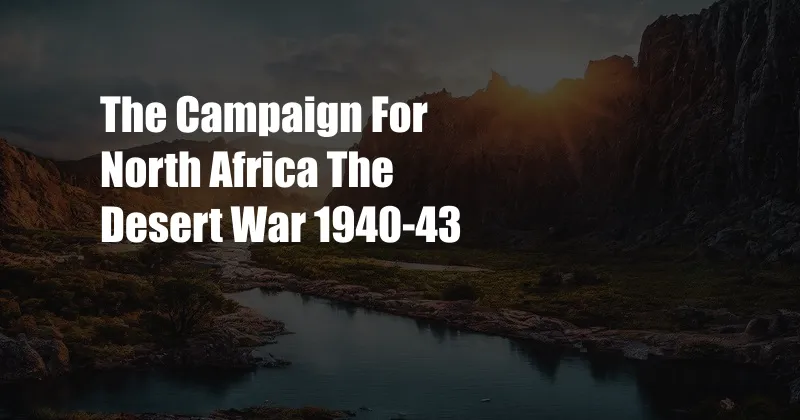
The North Africa Campaign: A Pivotal Clash in the Desert
The sands of North Africa became a fierce battleground during the Second World War, where the fate of nations hung in the balance. The North Africa Campaign, spanning from 1940 to 1943, witnessed some of the most pivotal clashes between the Allies and the Axis powers.
This intense conflict was characterized by rapid advances, daring escapes, and crushing defeats, shaping the course of the war in the Mediterranean. Let’s delve into the intricacies of this captivating campaign and uncover its profound impact on the global stage.
Prelude to the Conflict
In September 1939, Germany invaded Poland, igniting the Second World War. As the war spread across Europe, Italy, under the leadership of Benito Mussolini, sought to expand its colonial empire. With eyes set on North Africa, Italy invaded Egypt in June 1940.
In response, British forces, supported by Commonwealth contingents, mobilized to defend Egypt. Thus, the stage was set for a collision of wills and a bitter struggle for control of the vital Suez Canal.
The Early Battles
The first clash occurred in June 1940, as Italian forces crossed the border into Egypt. The British, caught off guard, were forced to retreat. However, the Italians were unable to capitalize on their initial success and were soon halted by British counterattacks.
In December 1940, the British launched Operation Compass, a bold offensive that pushed the Italians back into Libya. The British captured thousands of prisoners and destroyed much of the Italian army in North Africa. This victory boosted Allied morale and raised hopes for a decisive defeat of the Axis forces.
The German Intervention
Concerned about the Italian setbacks, Hitler dispatched the Afrika Korps, led by the brilliant German general Erwin Rommel, to North Africa in February 1941. Rommel’s arrival marked a turning point in the campaign.
The Afrika Korps launched a series of devastating attacks, driving the British back into Egypt and threatening Alexandria. However, the British, supported by Commonwealth forces, regained their composure and launched a counteroffensive at El Alamein in October 1942. After a fierce battle, the British achieved a decisive victory, forcing Rommel to retreat to Tunisia.
The Allied Victory
The Battle of El Alamein was a turning point in the North Africa Campaign. It marked the beginning of the end for Axis forces in North Africa. In May 1943, the Allies launched a final offensive, capturing Tunis and Bizerte. Over 250,000 Axis troops surrendered, effectively ending the campaign.
The North Africa Campaign played a crucial role in several ways. It provided a vital link between Europe and Asia, allowing supplies and reinforcements to reach both fronts. It also protected the Suez Canal, a strategic passage for Allied shipping. Furthermore, the Allied victories in North Africa boosted morale and contributed to the eventual Allied victory in the Second World War.
Modern Relevance and Legacy
The North Africa Campaign remains a captivating topic today. Its lessons on leadership, strategy, and resilience continue to resonate. The conflict also highlighted the importance of international cooperation and the power of joint operations.
Moreover, the North Africa Campaign has inspired numerous works of literature, film, and other forms of media. These artistic representations serve to remind us of the sacrifices and struggles of those who fought and the enduring impact of the conflict on the global stage.
Tips and Expert Advice
If you are interested in further exploring the North Africa Campaign, consider the following tips:
- Read books and articles by historians and military experts.
- Watch documentaries and films that depict the campaign.
- Visit museums and battlefields to gain a firsthand understanding of the conflict.
- Reach out to veterans or their families to hear their firsthand accounts.
By engaging with these resources, you will deepen your knowledge and appreciation of this pivotal chapter in world history.
FAQ
Q: Who were the main participants in the North Africa Campaign?
A: The main participants were the Axis powers, led by Germany and Italy, and the Allies, led by Great Britain and the Commonwealth.
Q: What were the key battles of the North Africa Campaign?
A: The key battles included Operation Compass, the Battle of El Alamein, and the Battle of Tunis.
Q: What was the significance of the North Africa Campaign?
A: The North Africa Campaign played a crucial role in protecting the Suez Canal, linking Europe and Asia, and boosting Allied morale. It also contributed to the eventual Allied victory in the Second World War.
Conclusion
The North Africa Campaign was a complex and multifaceted conflict that left an enduring mark on history. From the daring advances of the Afrika Korps to the decisive victories of the Allies, this campaign showcased the human drama of war and the transformative power of international cooperation. By exploring the North Africa Campaign further, we can not only increase our knowledge but also gain valuable insights into the nature of war and the challenges and triumphs of the human spirit.
Are you fascinated by the North Africa Campaign and eager to learn more about its complexities and impact? Share your thoughts and questions in the comments section below.